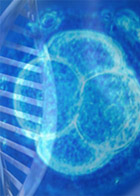Life from the Lab

Led by J. Craig Venter, genetic scientists have created a partially synthetic, self-replicating bacterial cell. According to an account in the May Science, the team built a synthetic genome from scratch and then put it into a living natural cell. Although the result does not qualify as a truly synthetic life form, Venter's achievement has been hailed as bringing us "a step closer to artificial life" and as a "defining moment" in the history of biology.
Others are not so sanguine. The environmentalist group Friends of the Earth castigated Venter for his "dangerous new technology." Catholic theologians, while lauding the feat, cautioned that only God can originate life and give it meaning. Noting "concerns," Barack Obama instructed the President's Council on Bioethics to study the issues raised by synthetic biology.
Of course, concerns over the encroachment of scientists into the deepest questions of life are nothing new. In the field of contemporary biogenetics, two watershed events were the first successful birth, in 1978, from in-vitro fertilization (IVF) and, in 1996, the birth of a cloned sheep named Dolly. More recently, controversy has raged over the issue of embryonic stem-cell research.
How have thinkers representing the Jewish religious, legal, and ethical traditions responded to these issues? As a rule, they have tended to focus on the intent of scientific experimentation while acknowledging the treacherous problem of the "slippery slope"—that is, the capacity of even well-intentioned efforts, cloaked in the mystique of science and holding out the promise of healing, to slide into immorality.
When it comes to particular genetic technologies, almost all Jewish ethicists, in contrast to most of their Catholic colleagues, have embraced in-vitro fertilization; the Jewish state, with the blessing of its rabbinic establishment, is one of the most IVF-friendly countries in the world. Dolly's creation, on the other hand, evoked a mixed reaction in Israel. The then-Sephardi chief rabbi ruled that Jewish religious law does not forbid cloning even humans, but his Ashkenazi counterpart was considerably more cautious. Jewish ethicists in the United States are similarly divided; while even some Orthodox thinkers see an ethical case to be made for cloning, Leon Kass, the former chairman of the President's Council on Bioethics, is prominent among opponents.
What about the creation, destruction, and harvesting of human embryos for purposes of research? Conservative Judaism, guided by the reasoning of Rabbi Elliot Dorff, expresses precautions but supports such research. Leading Orthodox authorities have ruled, more narrowly, that tissue from aborted fetuses in the early stage of gestation may be used, although a few vigorously demur altogether. Again by contrast, Catholic theologians, and the Catholic Church, stand foursquare against the destruction of nascent life for scientific or any other purposes.
Whether or not Craig Venter's success in building a genome from scratch brings us a step closer to artificial life, it serves as yet another reminder of just how slippery is the slope on which we stand.
Comments are closed for this article.




